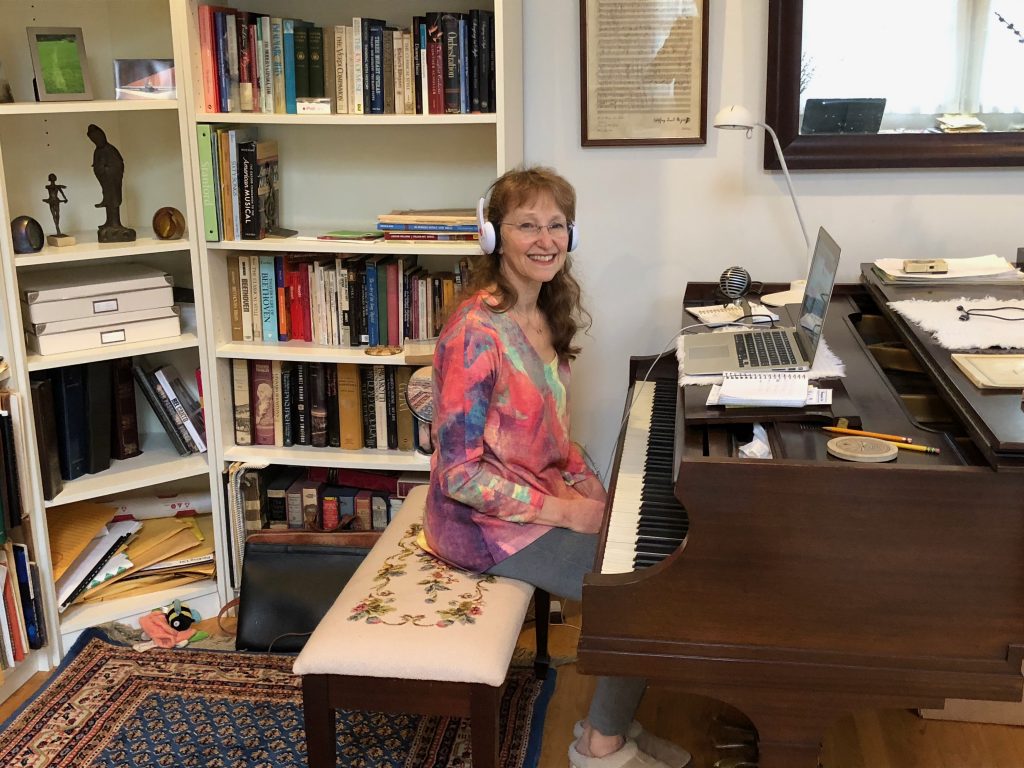June 1, 2020

The semester is finally over. Princeton had virtual Reunions on Saturday, a virtual Commencement on Sunday and a virtual Class Day on Monday. Now is a good time to capture some thoughts on what it was like to teach and adapt to this new world. When I got home from Forest Refuge on March 17 the world was in a panic and closing down. I was actually quite a bit ahead of the game getting ready to teach online since I had done some research and preparation a week earlier. Classical Singer Music and the NATS organization offered a wealth of advice and information to voice teachers about how to teach virtual voice lessons. I can’t say how thankful I am for their support and encouragement. I already had a decent microphone from reading for Learning Ally and I dug out a pretty nice set of wireless head-phones Michael had gotten for me several Christmases ago. I learned how to invite my students to zoom meetings and adjust my audio settings to optimize sound for singing. I downloaded the full Appcompanist library to my phone. I organized the bookshelves behind the piano and made them look presentable and attractive as a background. I was feeling pretty calm and present from my time in Barre. I was ready to meet my students online.
It took a while to get the hang of the timing needed for conversation and making music back and forth on zoom since only one person can make sound at a time. We needed patience to wait to speak, to wait for the sound delay, to wait for internet glitches to clear, to adjust sound preferences, to share sheet music on the screen etc. etc. etc. It took several weeks for the students to get Appcompanist on their phones, to get ear buds and microphones and speakers for the accompaniment tracks. It took more weeks for them to learn how to work with the Appcompanisttracks so they could feel confident and in charge of the tempo and rubato and fermatas. I had to adjust to a wide range of sound quality and internet stability. Some students sounded fine using just their computer audio, mic and speakers. Some sounded just awful, especially the higher sopranos who overloaded the system with overtones as soon as they got to the top of the staff. Some students had perfectly fine internet connections. Some were impossible, freezing and glitching constantly. I had no idea if the trouble was on their end or on mine, or if Michael being online at the same time made a difference. He was trying to teach his conducting class on zoom and had a whole different set of issues to deal with. The music room is pretty far away from our router, but there was not much I could do about that since I had to sit at the piano. It was a great opportunity to practice patience.
Overall, it was wonderful to see my students every week, and I’m sure they appreciated the one on one time with a familiar face. I was grateful for something productive to do and a way to be helpful and supportive in the midst of fear and despair. A few students disappeared, for financial or other reasons, but most of them stayed with it. I always asked how their family and neighborhood was and listened compassionately as they told their stories about home and school. The students in NYC were surrounded by death and disruption. The ones in more rural areas saw sheep and salt marshes out their windows, even while staying sheltered inside. It was sweet to get to know the stuffed animals and posters of their childhood bedrooms, and family members and pets who came through the room, and it was miraculous teaching students in California, Japan and the UK. Some of their other classes and projects were outright cancelled, while some adapted to the new format and continued productively. Some were frustrating as professors phoned in notes or slides with little engagement, while still other professors gave even more work thinking that the students didn’t have anything else to do. I heard the gamut of reactions, and all of the students complained of “zoom fatigue,” that malaise that came from hours in front of a computer screen. The first week, I too was exhausted from 20 hours of the new routine including Princeton and private students, but actually, I got used to it pretty quickly. The commute was a breeze and I certainly couldn’t complain about the parking! I did brush my hair and put on lipstick before I appeared on camera, but otherwise the dress code was comfy tops, leggings and slippers. After adjusting to the new technical demands I even started to get some good voice lesson work done.
At the end of the semester, I did group studio classes as I always have. Five or six students came to a zoom room and sang for each other using Appcompanist. It was a lot of fun and everyone was really happy to see each other. My one senior in the Program in Performance was the only singer to do a live jury on zoom, and two of my students, including her, did live streamed recitals. They had a great time and were courageous pioneers, forging new paths in music performance. Who knows how long this will continue to be the new normal. With the news that singers are “super spreaders” and singing is a very dangerous way to transmit the virus, it may be for a while.
